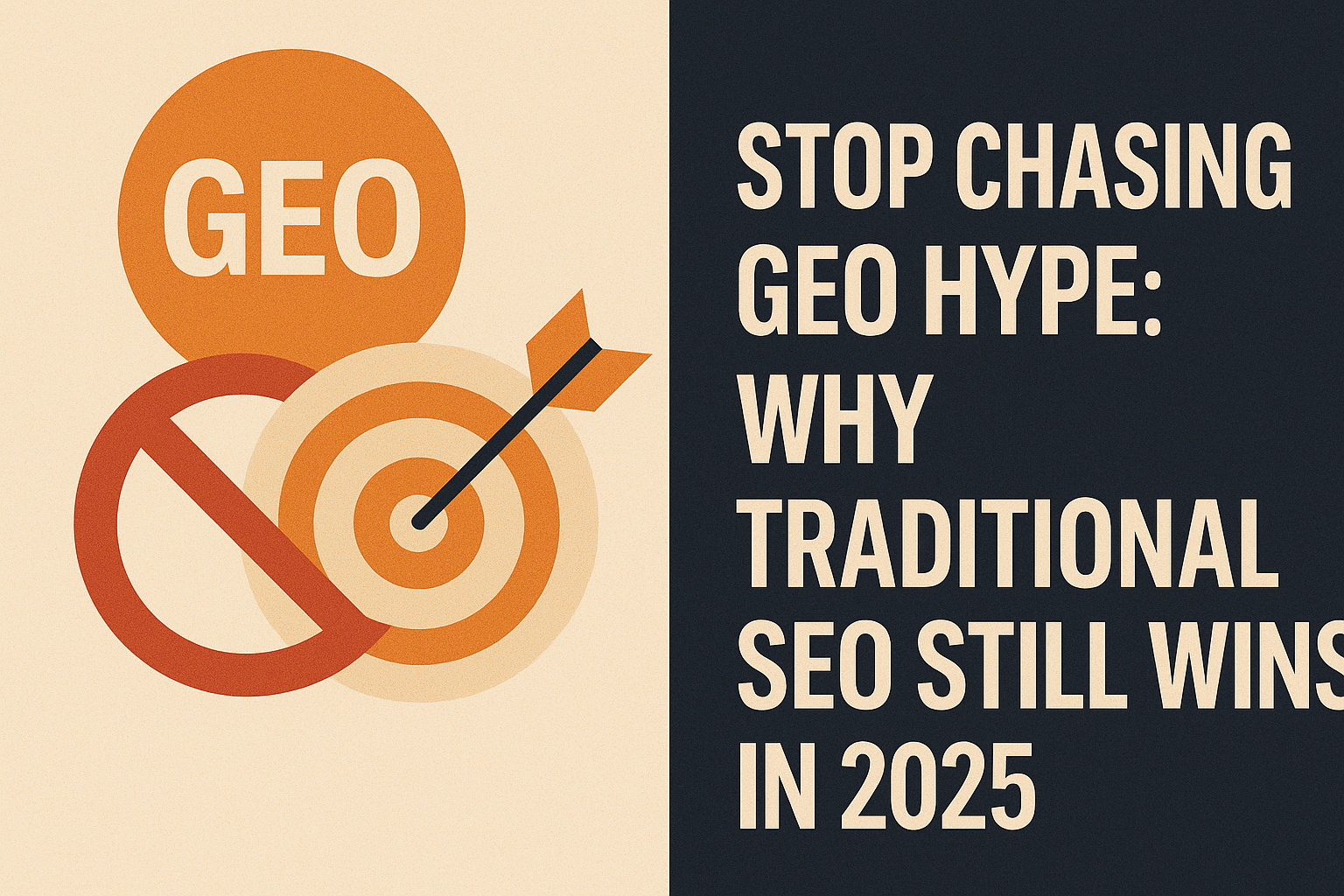In recent months, digital marketing conversations have been flooded with a new buzzword: GEO, short for Generative Engine Optimization. The idea behind GEO is to optimize your content so that AI-powered tools like ChatGPT, Perplexity, and Gemini cite it in their generated answers.
Across LinkedIn and marketing forums, countless “AI search experts” are promising to make brands GEO-ready. Some companies are even hiring GEO specialists or shifting entire content strategies toward this so-called “AI-first optimization.”
Before joining the trend, it’s worth taking a closer look. The truth is simple: you are being sold a solution to a problem that does not exist yet. While GEO might play a role in the future, right now traditional SEO remains the most effective strategy for driving real traffic and measurable growth.
The Traffic Reality Check
To understand the difference, let’s start with data.
Even today, traditional search engines control almost all meaningful web traffic. Google leads with more than 90 percent of global searches, while Bing still holds around 3 percent. That may sound small, but it translates to millions of daily visits and conversions for websites that are properly optimized.
Now look at AI-based search tools. Despite the hype, the total number of queries across all AI platforms combined is still a fraction of Bing’s search volume. And here is the key point: AI-generated answers rarely send users to your website. Instead, they keep people inside their own platforms.
A citation from ChatGPT might look impressive, but it does not bring in traffic, clicks, or conversions. You might gain visibility, but visibility without visitors does not grow a business.
Traditional SEO brings users to your website.
GEO gets you mentioned inside another platform.
These are completely different outcomes. One drives sales and leads. The other provides exposure that cannot be measured.
This is why chasing GEO at this stage is more hype than strategy.
Why Traditional SEO Still Matters
Despite all the new trends, the foundation of SEO has not changed. The same practices that have worked for years continue to deliver results because they align with what users and search engines both want: useful, credible, and high-quality content.
In fact, what helps your website rank in traditional search is exactly what AI systems look for when selecting reliable information. In other words, good SEO is already GEO.
Here is what defines strong SEO performance:
- Authority and credibility through quality backlinks
Links from trustworthy websites remain one of the strongest signals of expertise and reliability. - Clear and well-structured information
Content that is easy to read, logically formatted, and designed for humans helps both users and algorithms understand your expertise. - Comprehensive topic coverage
Going beyond keywords and offering in-depth explanations makes your site a stronger reference point. - Technical excellence
A fast, secure, and crawlable site ensures search engines and AI systems can access and understand your pages correctly. - Engagement and satisfaction signals
When users stay longer, scroll deeper, or return to your site, it sends powerful trust signals to algorithms.
If you compare these points to what AI systems such as ChatGPT or Gemini use to select citations, the overlap is clear. The ranking factors have not changed. They have only been renamed.
The GEO Myth: Why It Is Too Soon to Bet On It
The idea behind GEO makes sense in theory. As AI becomes a bigger part of search, you want your brand to be visible inside those AI-generated responses. However, there is no clear or proven method to measure GEO success yet.
There are no analytics tools that show referral traffic from AI engines, no reliable tracking systems, and no confirmed ranking signals specific to GEO. Even if your brand gets cited, there is little evidence that it will increase leads or sales.
AI tools are still learning how to handle information responsibly. Their results can change daily, and their data sources are not always transparent. Building an entire marketing plan around something so unpredictable is risky and premature.
In short, GEO may be interesting, but it is not yet profitable.
Until AI platforms start driving measurable traffic or offer clear engagement data, businesses should continue focusing on SEO strategies that already deliver results.
What You Should Focus On Instead
Before shifting to GEO-specific tactics, ask yourself some honest questions:
- Have you optimized your website for both Google and Bing?
- Have you built strong topical authority in your niche?
- Are your technical SEO issues fixed?
- Do you have a consistent content strategy that serves user intent?
- Are you earning backlinks and mentions from trusted sources?
If you have not achieved these yet, GEO should not be your priority. It is like decorating a house before building the walls. The foundation must come first.
Traditional SEO covers every part of that foundation — from keyword strategy and technical performance to content structure and link reputation. Once these elements are strong, your website will naturally attract the kind of credibility that AI systems also look for.
Building SEO That Is Ready for the Future
While GEO may not be essential today, the evolution of search shows one clear trend: trust and expertise matter more than ever.
Search engines and AI tools are both prioritizing content that feels real, transparent, and experience-based. Here are some proven ways to align your SEO strategy with this new landscape:
1. Highlight Real Authors and Credentials
Add author bios, credentials, and verified links to professional profiles. This builds trust and shows your expertise in the field.
2. Publish Experience-Driven Content
Focus on case studies, lessons learned, and insights that reflect firsthand experience. This is the kind of information AI cannot easily replicate.
3. Organize Content into Topic Clusters
Create connected pages around central themes. This helps both users and algorithms understand the depth of your expertise.
4. Keep Your Technical Foundation Strong
Maintain a fast, mobile-friendly website with structured data and clean architecture. Technical reliability supports both rankings and future AI visibility.
5. Measure and Improve Engagement
Track how users interact with your content. Long sessions, repeat visits, and strong click-through rates are signals of genuine authority.
These steps build a brand that both search engines and AI models recognize as reliable. The more valuable your content becomes to real users, the more likely it is to appear in every type of search — human or machine.
GEO Should Be a Result, Not a Strategy
The most practical mindset shift for 2025 is to view GEO as a result of excellent SEO, not a replacement for it.
When your content is credible, structured, and valuable, AI systems will naturally reference it. You do not need to “optimize for AI” separately. Instead, you should continue optimizing for people, because that is exactly where AI learns from.
Think of GEO as an added benefit that grows automatically when your SEO is done right. Let it enhance your visibility, but never let it distract you from your primary goal: building sustainable traffic through proven methods.
The Takeaway
The SEO strategies that worked five years ago are still effective because they are built on principles that never go out of style — expertise, clarity, and value.
Businesses that continue investing in these fundamentals will not only maintain strong rankings but also be well-prepared for the next generation of search. Those that abandon SEO to chase unproven GEO trends risk losing both visibility and credibility.
If you want your brand to grow, focus on what is real and measurable today.
Master your SEO fundamentals. Strengthen your content. Earn trust.
When AI search becomes mainstream, your website will already be the kind of source it relies on.
That is the real power of staying grounded in traditional SEO.

